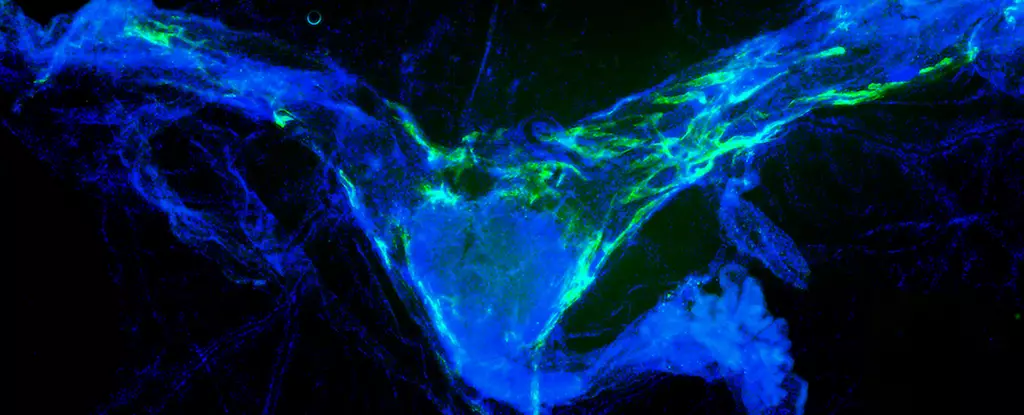As we traverse through life, the once-sharp faculties of our minds begin to wane—an inevitable truth that confronts everyone. Aging is not just a number; it carries with it a multitude of challenges, particularly on cognitive functions like memory retention and problem-solving abilities. What many might not realize is that remarkable scientific strides are being made to combat this decline through innovative research focused on enhancing our brain’s waste clearance systems. It’s a fascinating intersection of biology and technology that holds the promise of revolutionizing how we perceive aging.
Revealing the Role of Meningeal Lymphatics
A team of dedicated researchers at Washington University in St. Louis has shed light on the critical role of meningeal lymphatics—the unsung heroes in the brain’s waste management system. These vessels, integral to maintaining the overall health of the brain, are responsible for flushing out toxins that can lead to cognitive impairment, especially in aging populations. The study demonstrated that through a targeted protein treatment aimed at stimulating the growth of these essential vessels, older mice exhibited noticeable improvements in memory function. This breakthrough isn’t just a minor success—it’s a profound revelation that we may hold the keys to delaying or even preventing debilitating conditions like Alzheimer’s.
In our collective understanding of the brain, we often overlook the impact of physical systems running parallel to neural pathways. The lymphatic vessels are the cleanup crew, ensuring that neuronal communication remains fluid and unimpeded. If left unchecked, toxic waste can accumulate and create blockades, disrupting the pathways needed for effective brain function. Such revelations prompt a reassessment of how we approach brain health—perhaps it’s not solely about revitalizing neurons but also maintaining the integrity and efficiency of their environment.
The Interleukin Dilemma: A Double-Edged Sword
Another intriguing aspect of this research touches on the role of interleukin 6, a protein used by overwhelmed immune cells known as microglia. This protein acts as a distress signal that is indicative of an overworked and stressed environment within the brain. The study highlights that by boosting the function of meningeal lymphatics, the levels of interleukin 6 decreased, facilitating a more balanced state within the brain’s immune system. This is particularly important, as prolonged stress can lead to neurodegeneration—a terminal fate for cognitive functions.
The findings serve as a stark reminder of how interconnected our bodily systems are. When one part falters, others tend to buckle under pressure. It’s a delicate equilibrium, and the failure to maintain optimal levels within our immune signaling can violate this balance, compounding age-related issues. Hence, this research does not merely scratch the surface; it dives deeply into the biological intricacies that govern our brain’s longevity and performance.
The Path Forward: Outmaneuvering Traditional Barriers
One of the most exciting aspects of this research is the revelation that targeting the meningeal lymphatic vessels, which exist just outside the brain, allows for treatments without the need to penetrate the complex blood-brain barrier. For decades, this barrier has posed significant challenges for developing effective therapies for neurological disorders. Progressing beyond this hurdle opens up a plethora of possibilities for advancements in cognitive health.
This necessitates a paradigm shift in how treatments are conceived and developed for the aging brain. Instead of gravitating towards methods that aim and fail to penetrate the blood-brain barrier, we can leverage this newfound understanding to create interventions that are both effective and easily deployable.
When Trash Collection Shapes the Future of Cognition
Drawing an analogy from daily life, consider the analogy of trash accumulating on railway tracks; it halts progress and movement. The condition of our brain is no different. Without an effective clearance system, vital communication networks are compromised, producing a detrimental feedback loop that exacerbates memory decline and cognitive impairment. The vision for the future is clearer than ever: we are on the precipice of a new scientific era where we can optimize brain function through enhanced waste management.
Recent research findings align with earlier studies that indicate the viability of innovative approaches, such as boosting cerebrospinal fluid injections to enhance memory capabilities. This convergence of ideas underlines a common theme: the lymphatic system’s significance in sustaining essential cognitive functions and mitigating the effects of aging.
As we delve deeper into the impacts of aging on brain health, it’s critical to champion these efficacious strategies. Individual wellness should not be treated as an afterthought but rather as a priority that can lead us to impactful solutions that enrich lives not only in the later years but throughout the human experience.

